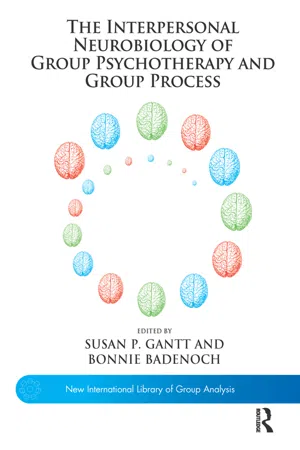
The Interpersonal Neurobiology of Group Psychotherapy and Group Process
- 240 pages
- English
- ePUB (mobile friendly)
- Available on iOS & Android
The Interpersonal Neurobiology of Group Psychotherapy and Group Process
About This Book
Might it be possible that neuroscience, in particular interpersonal neurobiology, can illuminate the unique ways that group processes collaborate with and enhance the brain's natural developmental and repairing processes? This book brings together the work of twelve contemporary group therapists and practitioners who are exploring this possibility through applying the principles of interpersonal neurobiology (IPNB) to a variety of approaches to group therapy and experiential learning groups. IPNB's focus on how human beings shape one another's brains throughout the life span makes it a natural fit for those of us who are involved in bringing people together so that, through their interactions, they may better understand and transform their own deeper mind and relational patterns. Group is a unique context that can trigger, amplify, contain, and provide resonance for a broad range of human experiences, creating robust conditions for changing the brain.
Frequently asked questions
Information
Table of contents
- Cover
- Half Title
- Title Page
- Copyright Page
- Table of Contents
- Acknowledgements
- About the Editors and Contributors
- New International Library of Group Analysis Foreword
- Introduction
- Chapter One Integrating interpersonal neurobiology with group psychotherapy
- Chapter Two Mirror neurons: their implications for group psychotherapy
- Chapter Three Group psychotherapy and neuro-plasticity: an attachment theory perspective
- Chapter Four Developing the group mind through functional subgrouping: linking systems-centred training (SCT) and interpersonal neurobiology
- Chapter Five Introducing couples to group therapy: pursuing passion through the neo-cortex
- Chapter Six Sensorimotor psychotherapy as a foundation of group therapy with younger clients
- Chapter Seven Hunger and longing: a developmental regulation model for exploring core relational needs
- Chapter Eight Relationship-focused group therapy (RFGT) to mitigate marital instability and neuropsychophysiological dysregulation
- Chapter Nine A transformational learning group: inviting the implicit
- Index